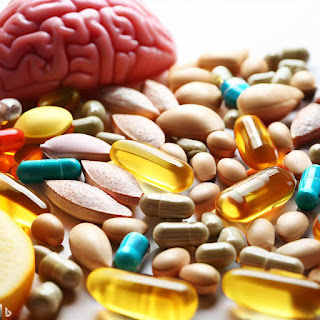Optimizing Brain Activity for Stress Reduction: A Comprehensive Guide.
by Shiva Kadiresan
I. Introduction
In our fast-paced world, stress has become an unwelcome companion in our daily lives. From work pressures to personal responsibilities, stress can creep in and take a toll on our mental and physical well-being. The good news is that you have the power to manage and reduce stress through effective strategies that optimize brain activity. In this comprehensive guide, we will explore the fascinating connection between brain activity and stress reduction. By the end of this journey, you'll be armed with valuable insights and actionable techniques to lead a calmer, more balanced life.
II. Chapter 1: The Brain's Role in Stress
Understanding the Stress Response
The modern world often feels like a relentless roller coaster of stressors. But did you know that your brain is intricately involved in this wild ride? In this section, we'll dissect the stress response, unveiling the physiological changes that occur when stress takes the wheel. From the surge of stress hormones to the lightning-fast neural pathways, you'll gain a deep understanding of how your brain reacts to stress, and why knowing this is the first step to managing it effectively.
The Amygdala: The Brain's Alarm System
Meet the amygdala, your brain's very own alarm system. This small, almond-shaped structure plays a pivotal role in detecting and responding to stressors. We'll take you on a tour of the amygdala's functions, revealing how it rapidly identifies threats and triggers your body's stress response. Understanding the amygdala's role will empower you to gain better control over those moments when stress pushes your buttons.
III. Chapter 2: The Impact of Chronic Stress on the Brain
The Long-Term Effects of Stress
Imagine stress as an uninvited guest overstaying their welcome. Chronic stress can wreak havoc on your brain, reshaping its structure and function. In this section, we'll delve into the long-term consequences of chronic stress, from shrinking brain regions to impairing cognitive abilities. By grasping the full scope of these effects, you'll be motivated to take action and prevent stress from remodeling your brain.
The Hippocampus: Battling the Stress Beast
Enter the hippocampus, the brain's memory center, and one of the stress beast's main targets. Chronic stress has a particular affinity for this region, affecting your memory and learning abilities. We'll navigate the intricate relationship between stress and the hippocampus, equipping you with strategies to protect this vital part of your brain from the ravages of stress.
IV. Chapter 3: Brain-Boosting Lifestyle Changes
Nourishing Your Brain with Diet
Imagine if you could feed your brain with the ultimate stress-fighting superfoods. In this section, we'll unveil a menu that not only nourishes your body but also supports optimal brain function. Learn about the nutrients that can reduce stress, enhance cognitive abilities, and keep your brain performing at its best.
Exercise: Fuel for Brain Wellness
Picture exercise as fuel for your brain's wellness. Whether you're a fitness enthusiast or just starting, this section has something for everyone. Discover how physical activity can boost brain activity, reduce stress hormones, and improve overall mental health. Say goodbye to those stressful days and hello to the mental clarity and positivity that regular exercise can bring.
Quality Sleep: The Brain's Recharge
Think of sleep as your brain's reset button. In this section, we'll explore the critical role of sleep in brain regeneration and stress reduction. From creating the perfect sleep environment to establishing a consistent sleep schedule, you'll uncover the secrets to harnessing the rejuvenating power of sleep for a stress-free life.
V. Chapter 4: Mindfulness and Meditation
The Power of Mindfulness
Mindfulness practices can reshape the brain's response to stress. We'll delve into mindfulness techniques and their impact on the brain. You'll discover how being present in the moment can reduce stress and boost overall well-being.
Meditation: Calming the Storm Within
Explore the science behind meditation and how it rewires the brain, reducing stress and enhancing emotional well-being. We'll guide you through various meditation practices to help you find calm amidst the chaos.
VI. Chapter 5: Stress Reduction Techniques
Deep Breathing: A Simple Elixir
Various deep breathing techniques can instantly calm your mind and reduce stress. Learn when and how to use them effectively in your daily life to maintain a sense of tranquility.
Progressive Muscle Relaxation: Tension Release
Discover how progressive muscle relaxation can alleviate physical tension, leading to reduced stress and a profound sense of relaxation. This practice is a valuable tool in your stress-reduction toolkit.
Visualization: Guiding Your Mind
Visualization exercises can transport your mind to peaceful, stress-free places. We'll provide step-by-step guidance on using visualization techniques to ease stress and anxiety. You'll learn how to create your mental sanctuary.
VII. Chapter 6: Cognitive Behavioral Therapy (CBT)
Rewiring Negative Thought Patterns
CBT is a powerful therapeutic approach that can reframe negative thought patterns. We'll explore the principles of CBT and how it can help you break free from the cycle of stress and anxiety. You'll gain insights into challenging and changing unhelpful beliefs.
The Prefrontal Cortex: The Executive Decision-Maker
Learn about the prefrontal cortex, the brain's executive decision-maker, and how CBT strengthens its ability to control stress responses. By understanding this crucial brain region, you'll be better equipped to manage stress effectively.
VIII. Chapter 7: Supplements and Brain-Boosting Nutrients
The Role of Supplements
Certain supplements can support brain health and reduce stress. We'll explore options like omega-3 fatty acids, magnesium, and adaptogens. You'll gain insight into which supplements may be right for you and how to incorporate them into your wellness routine.
The Gut-Brain Connection
Discover the fascinating connection between your gut and brain and how a healthy gut can promote reduced stress and enhanced mental well-being. We'll explore the role of gut health in managing stress and provide tips for nurturing your microbiome.
IX. Chapter 8: Finding Balance in a Hectic World
Time Management and Prioritization
Effective time management techniques can significantly reduce stress. We'll discuss strategies for prioritizing tasks, setting boundaries, and finding balance in your daily life. By taking control of your schedule, you can minimize stressors and make time for self-care.
Social Connections: The Brain's Lifeline
Strong social connections can buffer against stress. Explore the importance of relationships and strategies for nurturing them. You'll learn how to build and maintain meaningful connections that support your overall well-being.
X. Chapter 9: Creating Your Brain-Optimizing Routine
Personalized Stress Reduction Plan
Now that you've learned about various strategies, it's time to create your personalized brain-optimizing routine. We'll guide you through setting goals, establishing a daily routine, and integrating stress-reduction techniques into your life. By crafting a plan tailored to your needs, you'll be well on your way to a life with reduced stress and increased well-being.
XI. Conclusion
The journey to optimize brain activity for stress reduction is a rewarding one. Armed with knowledge and practical techniques, you can take charge of your brain's response to stress and lead a more balanced, relaxed life. Stress may always be a part of life, but it no longer has to control your well-being. Embrace the power of your brain, and let stress become a manageable companion on your life's journey. As you implement these strategies and make them a part of your daily life, you'll find that stress no longer has a stranglehold on your well-being. Instead, you'll experience a newfound sense of calm, resilience, and fulfillment













Comments
Post a Comment